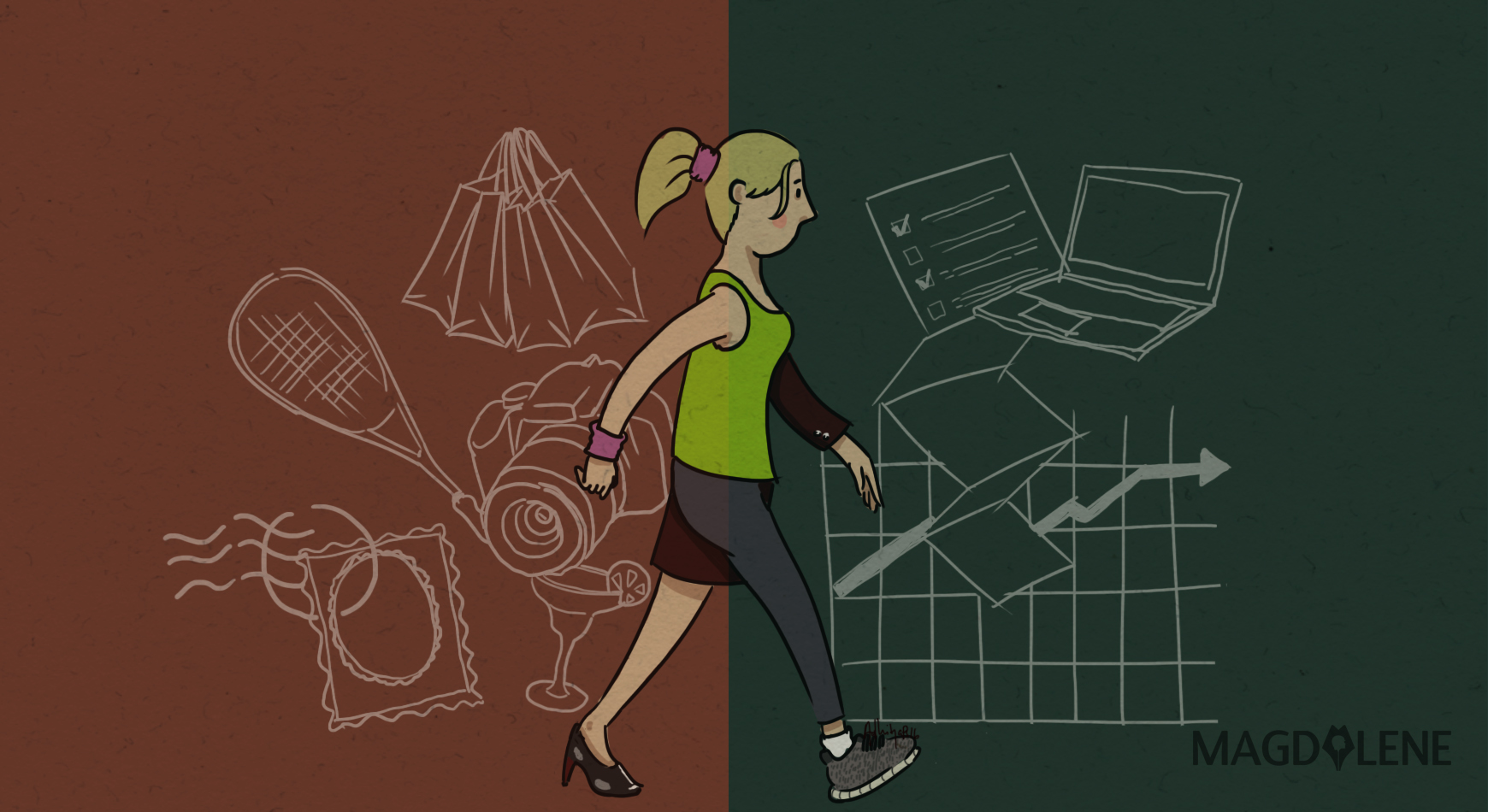Say the phrase, “work-life balance,” and what you see in your mind is a scale that forces you to weigh at least two competing, but important, elements in your life.
For women today, however, work and life are much more complex, encompassing more than just two distinct elements. “Work” can also mean professional development in the form of networking events, studies and continuous learning, and other skills-building activities; while “life” certainly encompasses more than just one’s family and personal relationships. It also includes one’s hobbies and “passion projects,” sports and physical activities, faith-based and socio-civic activities, and other pursuits that nourish one’s mind, body, and spirit.
The narrative these days is no longer about “balancing” discrete and separate elements of work and life; rather, it’s about “integrating” various aspects of the Self into one fluid – albeit not always seamless – whole.
At the recently concluded ASEAN Work-Life Balance Conference, held on February 23 to 25 at Cyberjaya, Malaysia, where parts of the McCann study were also discussed, women of various backgrounds spoke of their own definitions of “work-life balance” and “work-life integration” while sharing their own stories of how they have tried to realize this in their own lives.
For Malaysian entrepreneurs Lily Muas, Roziana Rashid, and Katharine Yip – who all spoke at a panel on “women empowerment” – achieving a more integrated lifestyle meant leaving their full-time corporate jobs to establish their own ventures.
Muas, a former telecommunications engineer who now owns and manages an online bookshop for Islamic children, spoke of her “5Ps” of “purpose, passion, perseverance, pillars of strength, and paying it forward.”
She spoke passionately about her desire to help educate children, and to be there for her family while giving her own children enough freedom to pursue their own passions someday. For her, “work-life integration” means expressing her beliefs and values through her work, and empowering others to do the same.
Rashid, who runs a training and consulting firm with her husband, spoke of the importance of being in a respectful partnership that allows both husband and wife to excel in their respective fields while maintaining their roles in the marriage.
“There are projects where I’m the boss and he follows my lead, and projects where he’s the boss and I follow his lead. But at the end of the day, I have to remember that he is my husband and the head of the family, and we have our own roles to play in the family.”
Yip, meanwhile, who runs a home-based translation business, spoke of the challenges of working from home while raising a family of young children. She spoke of the need to establish healthy boundaries for herself and her children, and also credited her husband for being an active partner at home and at work.
“Your spouse [or partner] has to be involved in your decisions, so that you can both see what’s best for both your business and your family… It’s not easy, especially with young children, but it can be done.”
“But you have to give up the idea that you can ‘balance’ things – there is no balance,” Rashid emphasized to an empathetic audience. “You need to know and set your priorities. You can’t do it all.”
It’s about ‘becoming’
In The Truth About Asian Women, a global “truth study”conducted by advertising giant McCann Worldgroup, it was revealed that “16-29 year-old Asian women place a higher importance on the motivation of ‘becoming’ as opposed to Asian men and the global norm.
‘Becoming’ is defined as the need for personal development, greater independence, and self-expression. It is important for these women to be seen as making their own decisions.’”
Whether in their choice of a career or in other life choices, more and more Asian women are agreeing to the statement, “We now find ourselves asking introspective questions like: who am I and what do I want?”
This is true even for women with children, who agree that “moms are not moms first.” According to the McCann study, “Traditionally, the role of being a mom involved sacrificing her ‘self’ for her husband and family. Now they are different and are putting themselves as their first priority. That is, they focus more time and energy on their own individual needs instead of others.”
The study notes further: “… today’s mother, who is in her early thirties, tries to map out the best way to care for her child in a world her own mother cannot recognize, while also wanting to make sure she does not lose her identity and become ‘just a mom.’”
However, this doesn’t mean that today’s Asian mom is selfish; the study actually points to a healthier relationship between moms and children. According to the McCann study, “Moms in Asia are likely to say they want to be friends with their children… They are also more likely to say they want to be a role model.
“In reality, what they often want is to be seen as playmates and life partners,” the study states.
From the ‘Supermom’ who knows and does everything, and is—to quote the children’s classic film Mary Poppins—“practically perfect in every way,” today’s Asian moms want to be seen by their children as who they really are—with a full view of their passions and triumphs, as well as their failures and flaws.
It’s possible – even with a ‘day job’
Speaking separately before the launch of her book, Don’t Forget the Parsley,Filipino-Canadian-American author and banker Claire Lim Moore—who wrote her two books while on two separate maternity leaves – shared insights that were related to those of Muas, Rashid, and Yip, but from the perspective of a multinational corporate executive.
“It’s not always automatic that you’ll be able to integrate your passion and your ‘day job.’ Sometimes you’ll have to start with more practical things first,” Lim Moore said. “First thing is you have to be competent and great at your job. That’s your baseline.
"You also need to be resourceful in terms of getting in front of the right people [that can lead you to opportunities] that you can be most passionate about. When you keep the two in mind, one thing leads to another.”
Lim Moore also shared in her book how her own husband, Alex, debunked the notion that one needs to do what one “loves” or is most “passionate” about in order to be happy.
“No, you don’t need to do what you love; you just need to have a purpose,” Lim Moore quoted her husband. The idea of finding meaning and purpose behind a job is something that this writer also discussed at the ASEAN Work-Life Balance Conference.
For millennials, especially, what matter most in every experience are authenticity, social justice, connection, self-expression, and purpose. In the context of work, therefore, millennial women will find more fulfillment in jobs or organizations where work can be a form of self-expression; where they won’t feel the need to compartmentalize the “selves they bring into the office” from “their real selves;” and where the purpose of their work and their role is clear.
The organizations that will thrive are those that will allow women to challenge and prove themselves, empower them to make certain (and substantial) decisions, and also give access to tools and technology that will help women look, feel, and do their best.
Despite the differences in their backgrounds and stories, one thing was made clear from these women’s discussions: a truly integrated life is one where priorities and values take precedence over profit and simply “doing a job.” Likewise, taking care of one’s self is just as important as taking care of others because, as Rashid shared, “I am my company’s main asset – I have to be healthy.”
There are no shortcuts to “work-life integration”, no “tried-and-tested formulas” or cookie-cutter solutions. At the heart of it all lie the answers to these questions:
- What do I believe in and what do I value?
- What are my non-negotiables?
- What can I afford to say ‘no’ to?
- For whom am I doing all these?
- In what kind of organization—whether my own or in an established company—will I most be able to thrive and be most fully myself?
Answering these questions will entail a journey in itself, but it is perhaps the most important journey that any woman will ever make—because it will inevitably be a journey back to the Self.
Niña Terol (@ninaterol) is AVP/Director for Corporate Affairs of McCann Worldgroup Philippines and a trustee of the women’s organization, Business and Professional Women (BPW) Makati. She was recently a panelist at the ASEAN Work-Life Balance Conference held in Cyberjaya, Selangor, Malaysia.
This story was first published in Rappler.com, a Manila-based social news network where stories inspire community engagement and digitally fuelled actions for social change.








Comments